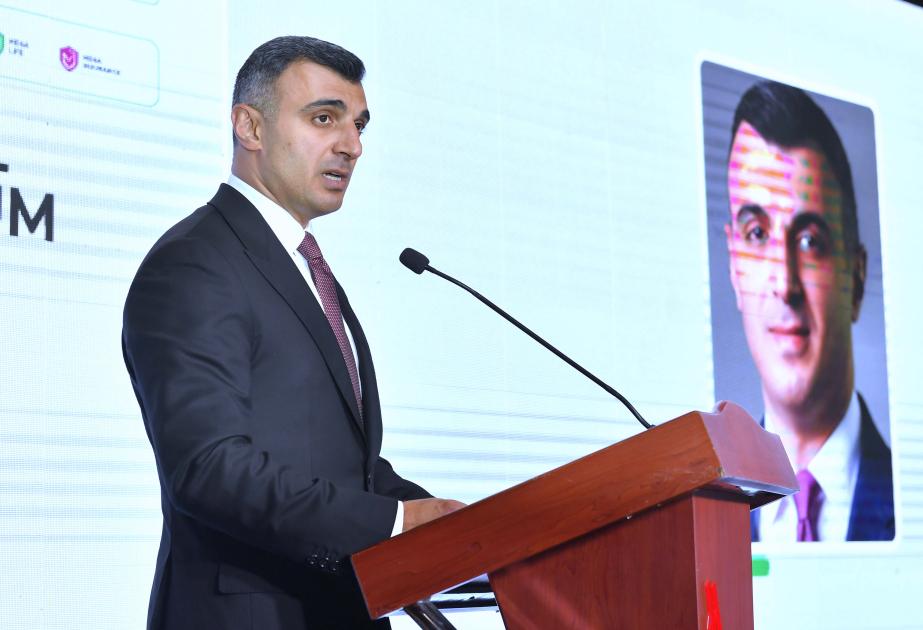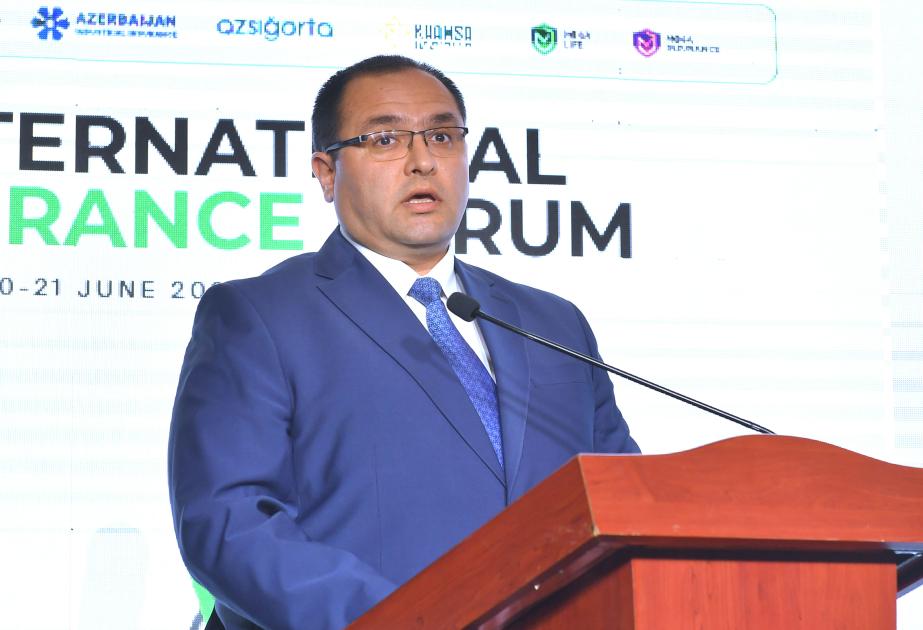Insurance market of Azerbaijan: Premiums rise amid persistent risks Review by Caliber.Az
The insurance market of Azerbaijan, which has successfully overcome the crisis of recent years, is showing quite decent growth dynamics for the third consecutive year. At the same time, Azerbaijan's relevant authorities see the need for industry reforms aimed at increasing the volume and penetration level of the domestic insurance market, as well as optimizing its structure in several directions.
Among the most important vectors identified are accelerating the digitalization of the industry and achieving broader coverage of the agricultural, medical, and climate segments. These and other issues were discussed on June 20-21 in Baku as part of the 10th Azerbaijan International Insurance Forum (AIIF-2024).
A decade-old global energy crisis significantly damaged Azerbaijan's financial sector. Drawing on this challenging experience, the Ministry of Finance and the Central Bank of Azerbaijan (CBA) undertook extensive efforts to strengthen the regulatory framework of the banking and insurance markets. Specifically, market participants in the insurance sector underwent sanitation measures, legislation was optimized, and industry indicators were improved. As a result, the impact of subsequent global force majeure events was noticeably minimized.
Evidence of the success of this policy includes the fact that during 2020-2023, domestic insurance companies managed to weather the negative consequences of the COVID-19 pandemic, subsequent oil price declines, and recent factors such as imported inflation and recession. Serious issues were faced only by two domestic insurance companies: the license of OJSC Revan Sigorta (insurance) was revoked in March 2021, and in July 2023, the CBA revoked the license of Günay Sığorta due to the closure of its parent structure and principal shareholder, Günay Bank.

In one way or another, 17 domestic insurance companies on the market have managed to avoid potential risks associated with fluctuations in demand for insurance services. Moreover, in recent years, they have been striving to expand their operations, including in regions across the country, promoting new products and adapting flexibly to market demand. "The assets of Azerbaijan's insurance sector have grown by 34% over the past three years, and the capitalization of participants has increased by more than 7%. At the same time, since 2019, premium insurance payments have increased by 26%," said Taleh Kazimov, Chairman of the CBA, speaking at the opening ceremony of the AIIF-2024 forum.
"It is important to note that measures have been taken to form reserves and strengthen institutions in accordance with international legislation and principles ensuring the insurance market, as well as for reinsurance and insurance purposes. Also, new methodologies have been introduced to increase public awareness of insurance services and improve the compulsory insurance mechanism, providing access to various opportunities in life insurance,” he added.

According to the statistical data from the Central Bank of Azerbaijan (CBA), this positive trend has continued into the current year: for instance, in January-April 2024, 17 domestic insurance companies collected 542.841 million manats ($319 million) in insurance premiums, which exceeds the figures for the same period last year by 16.1%.
However, it would be rash to stop at the achieved results, especially considering that Azerbaijan's economy is entering a new stage where the financial sector, including insurance, will play a crucial role. In this regard, the AIIF-2024 forum, organized at the initiative of the public association "Azerbaijan Insurance Association" (ASA), has become an optimal platform for discussing development goals and new methodologies to enhance the insurance market.
During the two-day forum, panel discussions will address such current topics as vehicle insurance, medical and agricultural insurance, as well as the role of insurance in managing climate risks. "There is significant potential in Azerbaijan to increase the penetration of insurance services, and our main goal is to realize this potential," believes Ulviyya Jafarova, Chair of the ASA Supervisory Board, a participant in the forum. According to the ASA leader, the domestic insurance market is growing today, but like global markets, there is a great need to continue reforms in certain areas, with digitalization and other IT innovations taking the top spot as indispensable tools for providing accessible and quality services.
Two other directions include the development of data resources, as market participants with a rich database are always one step ahead, and strengthening the information security of the insurance market, which is closely integrated into the digital environment.
In turn, according to the Chairman of the Central Bank of Azerbaijan, Taleh Kazimov, a strategic roadmap has been developed aimed at strengthening and managing the financial sector to achieve national priorities and ensure sustainable financial flows for the period 2023-2026. The strategy's key priorities include ensuring digitalization, enhancing human resource capacity, developing infrastructure, and implementing advanced practices.
"The key priority of this strategy is to ensure market stability, as well as planning to increase the volume and optimize insurance services. In this regard, the principle of 'minimal investment, optimal service level' will be implemented, along with the introduction of six modern technologies to improve the accessibility of insurance services and ensure high customer satisfaction levels, which in turn will help optimize the system as a whole," noted the head of the Central Bank.
"Considering all these aspects, the Central Bank has initiated a process of specialized regulation, including support for innovative changes and enhancing management efficiency, which is a crucial priority in the face of climate change and the increasing number of insurance cases that entail significant costs for both the population and the country's economy," he emphasized.
Among the priority directions of the insurance market outlined in the strategy for the near future are agriculture, medicine, and environmental insurance. "In the near future, Azerbaijan plans to expand the coverage of agricultural insurance and introduce more innovative insurance products to minimize the impact of climate change on the agricultural sector," believes Azerbaijan's Minister of Agriculture, Majnun Mamedov, emphasizing that currently, 25% of agricultural land in the republic is under insurance protection.

An equally important task for the future is strengthening the framework for universal and sustainable medical insurance. As noted at the forum by Zaur Aliyev, Chairman of the Management Board of the State Agency for Compulsory Medical Insurance, the implementation of this system guarantees the provision of effective medical services and improves healthcare financing processes.
"Considering the United Nations principle of 'leaving no one behind' within the framework of the Sustainable Development Goals (SDGs), the compulsory medical insurance (CMI) system is designed to meet the fundamental healthcare needs of the population. Thanks to the introduction of compulsory medical insurance in Azerbaijan, everyone, from children to adults, is covered by this system and has the right to free access to over 3300 medical services covered by insurance," added the head of the State Agency.
Interestingly, a recurring theme in many speeches by foreign participants at the forum was the impact of adverse climate change on the insurance sector. Over the next 10 years, expenses for insurance companies related to natural disasters could double, stated Gepa Jansen-Klaus, Vice President of reinsurance company Swiss Re. She emphasized that last year, 36 countries in Asia and North America were significantly affected by climate change. Natural disasters cost these countries approximately $200 billion, including economic losses from earthquakes in Türkiye and Syria reaching $8 billion, with 90% of this loss uninsured.
"Natural disasters such as floods, earthquakes, and hurricanes are occurring more and more frequently, and only a third of the damage worldwide is covered by insurance: this is a major problem, and solving it requires expanding the insurance market," stated Professor Karel van Hulle of the Catholic University of Leuven in Belgium during panel discussions. "In Azerbaijan's insurance sector, like in most countries, there are certain gaps, particularly in the underdevelopment of insurance products that would protect the population from natural disaster risks."
An optimal approach in this regard appears to be the expansion of the reinsurance market in Azerbaijan by involving leading international entities in this field. Specifically, Gepa Jansen-Klaus, Vice President of Swiss Re Europe, believes that developing reinsurance services can significantly enhance Azerbaijan's resilience, minimize financial risks, and promote stability in the insurance market. Addressing the reduction of insurance risks associated with worsening global climate conditions is one of the National Priorities for 2023-2026.
According to Ulviyya Jafarova, Chair of the ASA Supervisory Board, the increasing risks each year due to global climate change and the scale of damage incurred are important signals for the insurance industry. This topic will be discussed during the UN Climate Conference COP29 in Baku.








